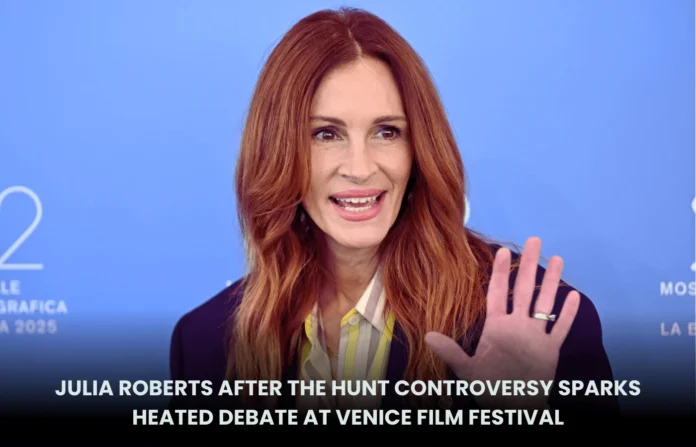The Venice Film Festival 2025 has turned into a battleground of opinions, with Julia Roberts at the heart of it as the “Julia Roberts After the Hunt controversy” dominates headlines and divides viewers. Her latest psychological thriller, After the Hunt, premiered out of competition at the festival, but instead of simply being celebrated for its storytelling and performances, the film has ignited debates over its handling of sensitive themes, particularly #MeToo, power dynamics, and morality in professional spaces.
Julia Roberts After the Hunt Controversy Explained
After the Hunt unfolds in the tense world of academia, where Julia Roberts portrays a highly regarded philosophy professor whose life spirals into turmoil when her ambitious mentee, played by Ayo Edebiri, accuses her trusted colleague, portrayed by Andrew Garfield, of misconduct.
As Roberts’ character struggles to mediate between loyalty, ethics, and justice, an unsettling secret from her own past begins to unravel — forcing her to confront her deepest fears and moral dilemmas.
The film’s complex narrative blurs the lines between right and wrong, making viewers question the dynamics of trust, mentorship, and personal responsibility. However, this layered storytelling is precisely what has led to the controversy. Critics and audiences are divided over whether the movie subtly undermines feminist ideals or sparks necessary conversations about consent and accountability.
Roberts Defends the Film’s Intent
Confronting the backlash directly at a fiery Venice Film Festival press conference, Julia Roberts stood firm as she passionately defended the creative vision behind the film. She made it clear that After the Hunt does not aim to deliver political statements or choose sides in the ongoing cultural discourse. Instead, the purpose is to reflect real-life complexities and leave room for interpretation.
“We’re not here to provide answers; we’re here to raise questions,” Roberts stated firmly. “If the film leaves people unsettled, debating, or even arguing, that means we’ve done our job right.”
This philosophy resonates with director Luca Guadagnino’s vision, who wanted the camera to act as a neutral observer, capturing characters in their rawest moments without manipulating audience emotions. By adopting this approach, the film invites viewers to decide where they stand rather than imposing a predetermined narrative.
Challenging Audiences and Restoring Conversation
For Roberts, the controversy isn’t necessarily negative. In fact, she believes it highlights one of the film’s greatest strengths — its ability to spark meaningful dialogue. Whether viewers walk away inspired, confused, or infuriated, the movie demands engagement.
She also lamented the decline of authentic conversations in modern society, suggesting that films like After the Hunt can reignite the lost art of discussion:
“We’re kind of losing the art of conversation in humanity right now. If this movie gets people talking — even disagreeing — that’s a victory.”
This statement resonates deeply in an era where polarized opinions often discourage open dialogue. The film’s refusal to provide simple resolutions encourages audiences to confront uncomfortable truths, reflect on their values, and discuss perspectives they may otherwise avoid.
Venice Film Festival Premiere and Reactions
Premiering out of competition, After the Hunt instantly became one of the most talked-about films at the Venice Film Festival 2025. Critics and audiences are deeply divided:
- Supporters praise the film for its bold storytelling, nuanced character development, and powerful performances, particularly from Roberts and Garfield.
- Skeptics argue that the narrative risks blurring critical lines around accountability and power, fearing that it may unintentionally diminish the impact of the #MeToo movement.
Director Luca Guadagnino’s cinematic style has also attracted attention, with his deliberate pacing, stark framing, and haunting tension creating an immersive experience that lingers long after the credits roll.
Final Thoughts
The Julia Roberts After the Hunt controversy represents more than just another festival headline — it embodies a broader cultural dialogue about how art grapples with sensitive, polarizing issues without becoming overly didactic. By refusing to simplify complex themes like morality, consent, and trust, After the Hunt challenges audiences to think, question, and engage.
Love it or hate it, the film has undeniably achieved one of cinema’s greatest purposes: provoking conversation. And if Julia Roberts’ goal was to inspire audiences to confront uncomfortable realities and debate their meaning, After the Hunt has succeeded spectacularly.


